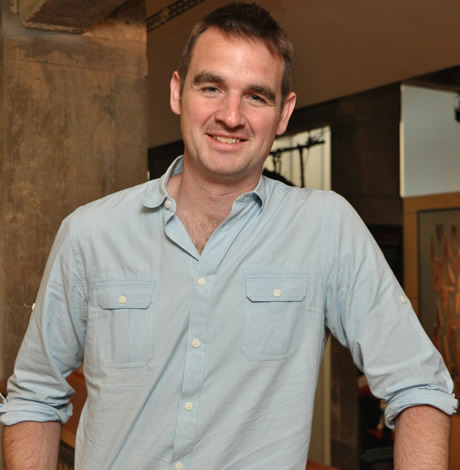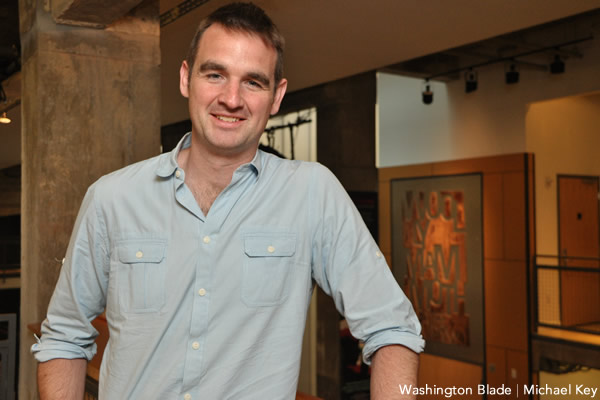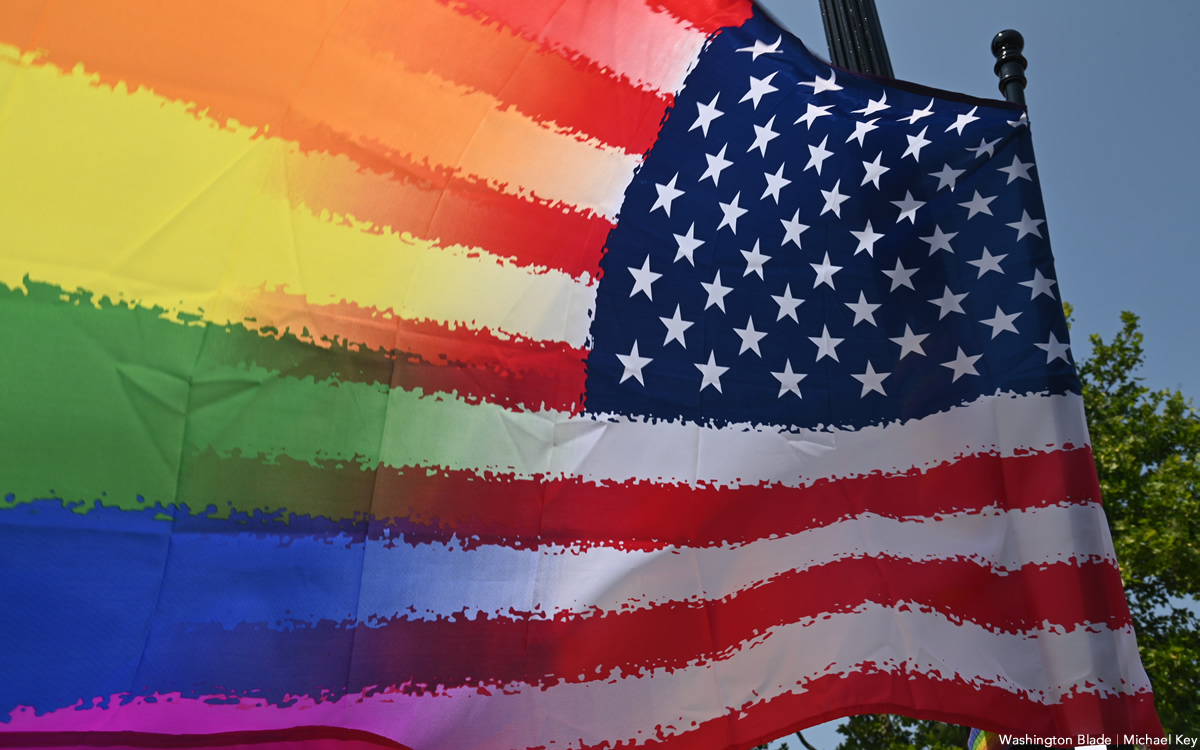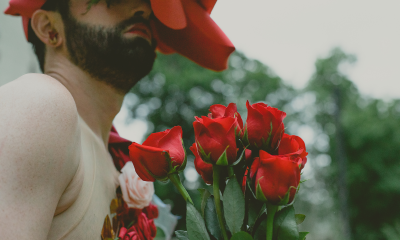Arts & Entertainment
Bold but vague
Out playwright explores political speech in new satire


Playwright Peter Sinn Nachtrieb’s new play is in the midst of a multi-city rollout premiere. (Washington Blade photo by Michael Key)
‘The Totalitarians’
Through June 29
Woolly Mammoth Theatre Company
641 D St., N.W.
$45-75
202-393-3939
In Peter Sinn Nachtrieb’s new political comedy “The Totalitarians,” it takes three words — “freedom from fear” — to turn a lopsided election around.
Former roller derby queen and all-around loose cannon Penelope Easter has political aspirations. Though she has zero knowledge of the issues and stands for nothing, Penny is undeterred. She’s rightfully confident that her big hair and her gay husband’s enormous fortune will open doors. But still, she needs help connecting with voters, low information and otherwise. That’s where Francine Jefferson comes in. Francine is a wannabe political operative with a talent for words. She believes that one killer speech with a catchy slogan repeatedly delivered by an appropriately passionate Penny could put this unlikely candidate on the path to becoming Nebraska’s lieutenant governor.
Meanwhile Francine’s doctor husband Jeffrey wants her to have a baby and stay at home. Besides, he doesn’t trust Penelope — even less when his young terminally ill patient Ben warns him of Penelope’s connection with a nefarious 1 percent cabal seeking to control all American politics. He joins militant Ben in trying to snuff out Penelope’s campaign.
Nachtrieb is tall (6’6”) and rangy. At 39, the gay playwright retains boyish charm and exudes a quiet intelligence. The inspiration for the “The Totalitarians,” he explains, came from a frustration with the language of politics and rhetoric; and whether anyone is actually saying anything or is it all just sound bites? He felt a need to dive into that.
“Penelope is very seductive cipher,” he says. “Whether she is left or right is uncertain. Seems like she’s fighting for something but you can’t pin down on what she stands for on any issue. Still Francine’s dream gets married to Penny’s. She writes some soaring, beautiful imagery reminiscent of early Obama’s — inspirational but with few specific references.”
And though Nachtrieb purports Penelope is not a commentary on any single party or person, her over-the-top vulgarity definitely come off more like Sarah Palin than Elizabeth Warren. Penelope is so outrageous, says the playwright, that in a different production she could easily be played by a male actor in drag.
“There is an attraction between Francine and Penelope. And the dynamic between Jeffrey and Ben is just shy of being a gay relationship. There are those clandestine meetings in cruisy parks. And the long hernia examination that Jeffrey gives to Ben is interesting.”
Commissioned by the New Play National Network, “The Totalitarians” is currently undergoing a year-long rolling premiere that kicked off at Southern Rep in New Orleans and is now playing at Woolly Mammoth. Later this year it will play at Z Space in San Francisco where Nachtrieb is playwright in residence.
Woolly’s production is staged by talented gay playwright and director Robert O’Hara. The cast features local actors Emily Townley and Dawn Ursula as Penelope and Francine, respectively. Jeffrey is played by Sean Meehan who played Morton in HBO’s production of “The Normal Heart,” gay dramatist Larry Kramer’s seminal AIDS play. Chicago actor Nick Loumos plays Ben. It’s Nachtrieb’s second collaboration with Woolly Mammoth. The first was his dark, apocalyptic comedy, “boom.”
Growing up in affluent Marin County, the suburb across the Golden Gate Bridge from San Francisco, Nachtrieb who’d been bullied in middle school, found a safe haven participating in musical theater. He majored in theater and biology at Brown University. While there, he came out during a production of “West Side Story.” (“All the other Jets were gay. I thought I must be too.”) He returned to the Bay Area where he entered the San Francisco State MFA Playwriting program, and earned his MFA in creative writing in 2005.
Today Nachtrieb lives in San Francisco’s Mission District with his partner of 13 years, Mark Marino, a nurse. Sometimes his relationship and feelings are reflected in his work, sometimes through straight characters: “Francine and Jeffrey talk about having children and the challenges of busy work schedules. Those are discussions my partner and I have, too.
“And for instance, Ben, the young activist, has a monologue that isn’t just about wanting equality but sometimes you want a little vengeance as well for being treated badly.”
Next up, Nachtrieb is working on a new play concerning house tours. “It’s all about shame,” he says, “and the pleasures of hiding things.”

The Rainbow History Project will host “Pickets, Protests and Parade Exhibit Tour” at 7 p.m. at Freedom Plaza. This event honors the courage, resilience and resistance of D.C.’s gay community. For more details, visit Eventbrite.
Go Gay DC will host “LGBTQ Community Social” at 7 p.m. at Hyatt Centric Arlington (1325 Wilson Blvd.). This fun event is ideal for meeting new people and community building. Attendance is free and more details are available on Eventbrite.
Xavier Entertainment DC will host “Cowboy Carter Afterparty” at 10 p.m. at Nellie’s Sports Bar. There will be fireworks, parades, and patriotic fun. For more details, visit Eventbrite.
Mezcal Amaras will host “Sha Boing Boing Showdown” at 6 p.m. at Snappy’s Small Bar (3917 Georgia Ave., N.W.). Get ready to test your hotdog eating abilities. Tickets start at $12.51 and can be purchased on Eventbrite.
Illusions Drag Queen Show will host “Drag Queen Dinner Show” at 7 p.m. at 2323 18th St. N.W. Guests will be treated to the very best celebrity drag impersonations in entertainment. Tickets start at $12.97 and are available on Eventbrite.
Thurst Lounge will host “A Thirsty Cowboy Afterparty” at 5 p.m. DJ Apollo will be performing. For more details, visit Thurst’s website.
9:30 Club will host “Gimme Gimme Disco: A Dance Party Inspired by ABBA” at 9 p.m. The DJ will play plenty of disco hits from the 70s and 80s. Tickets cost $45.30 and can be purchased on Ticketmaster.
a&e features
Doug Spearman takes his chance
‘Noah’s Arc: The Movie’ debuted on Paramount+ last month

There’s no question that when Patrik-Ian Polk’s series “Noah’s Arc” premiered on Logo 20 years ago, it was a groundbreaking creation. The story of a group of Black gay men and their wonderful friendship. The titular arc was that of the cute main character, Noah (Darryl Stephens), and his close-knit circle of friends, including Chance played by gay actor Doug Spearman. This compelling and loving fraternity may, in fact, be what brought viewers back repeatedly, including a 2008 movie, “Noah’s Arc: Jumping the Broom,” as well as the 2020 “Noah’s Arc” short, and now, a new full-length feature “Noah’s Arc: The Movie,” debuting on Paramount+ on June 20. In the movie, filled with equal measures of laughs and tears, Chance, who has faced a devastating loss, finds his dependable friends there, ready to support and comfort him at a moment’s notice. I had the pleasure of speaking with Spearman the morning of the streaming premiere of “Noah’s Arc: The Movie.”
WASHINGTON BLADE: Doug, since the early 2000s, when the “Noah’s Arc” series premiered on Logo, you have been playing the character of Chance, including in the latest installment, “Noah’s Arc: The Movie.” What was it about Chance that appealed to you as an actor?
SPEARMAN: When Patrik (-Ian Polk) called me to ask me to play him (Chance), I was at JFK airport in the baggage claim, waiting for a suitcase. He explained what the part was. The thing that stuck out to me was the fact that Chance was in a long-term relationship with another Black man. And, they had a child; they had a 4-year-old daughter named Kenya. I had never seen two Black gay men raise a child on TV before. I thought it was the most revolutionary thing I’d ever seen. I immediately thought I’ve got to do this because that was something nobody had seen. I thought it was incredibly important to take the part.
BLADE: “Noah’s Arc: The Movie” was, once again, written and directed by Patrik-Ian Polk, who you just mentioned, is the creator of the entire franchise. What’s the secret to your long-standing working relationship?
SPEARMAN: [Laughs] the whole team, all of us, are like a band of brothers. We fight like brothers, we come together like brothers, we hash things out, we talk, because we’re all very different from our characters. I think the challenge of playing these guys and then uplifting these men, playing a part, especially something written by Patrik, is like solving a math equation. There’s always a challenge that’s enjoyable for me as an actor: to try to find out what it is that Patrik wants, and then how do I do it.
BLADE: I think you do a very good job of it.
SPEARMAN: Thank you very much
BLADE: In the years between “Jumping the Broom” and the new full-length movie, many changes have occurred, and the story addresses some of them, including gay widowhood, which is something that the aging community is now confronting, as well as mental health issues. Please say a few words about how you approached those subjects in the new movie.
SPEARMAN: I had a lot of loss in my life, right before we started shooting. Two months before we started shooting the first series, my mother died. I was going through the grief process through that whole first season. Since then, I’ve lost a lot of people in my life. In fact, when we started shooting the second season, the second week we were shooting, my ex died of a heart attack. I was having to fold that into what I was doing with my life on the set and off the set. You’ve got to show up and you’ve got to do your work. The first two seasons of “Noah’s Arc” are always tinged with the memory of grief. So, when I had to deal with the death that Chance faces (in the new movie), which is a significant death in his life, it wasn’t that hard to reach back, especially the scene in the graveyard. It was something that I unfortunately could pull from personal experience.
BLADE: Shifting gears, the movie features delightful cast surprises, including Jasmine Guy and TS Madison. Did you have a chance to interact with either or both when they were on set?
SPEARMAN: No, I didn’t have any scenes with Jasmine, and I missed her. I wish I had gotten to see her because I actually got to direct Jasmine for a CBS promo shoot for “Queen,” back in the early ‘90s. I had a huge crush on her when she was on “A Different World.” So, I really would have liked to reconnect. But TS and I got to see each other every day because I was in all her scenes. It was extraordinary being around somebody like that. That is one outspoken woman!
BLADE: Even though Beyoncé never makes an appearance in the movie, there’s a lot of talk about her. Would you say you are a Beyoncé fan?
SPEARMAN: Yes! I’m breathing! Yes, I’m a Beyoncé fan. I actually got the chance to meet her. I knew her mom. Her mom was extraordinary to me. She is in the second movie I directed. She also gave us a wedding gown to use in the very first scene of the movie. That family is extraordinarily important to me. Not only just to be a fan, but to be somebody who’s gotten to know them and work with them and see how hard they work. I don’t think anybody works as hard as Tina or Beyoncé.
BLADE: There was a recent news item about gay actor Benito Skinner of the Amazon Prime series “Overcompensating” being told not to bother auditioning for straight roles. As an out actor yourself, how important do you think it is for queer characters to be portrayed by queer actors, and vice versa?
SPEARMAN: Being queer is a multifaceted identity. There’s no one kind of queer person. I think finding the best actor that’s your first circle of casting. I think one of the joys about being an actor is that you get to play different parts. I play straight guys all the time. Dads and husbands and things like that. I think a lot of people are told not to do it. In fact, I wouldn’t be Chance if the actor who was originally cast as Chance hadn’t been pulled out of the series by his agents because they didn’t want him to play a gay character.
BLADE: That’s amazing! Thank you for sharing that. Without giving away too much, the ending of the movie is a little ambiguous, even ending with a question mark. If there was a “Noah’s Arc: The Movie” sequel, would you come back for that?
SPEARMAN: Yeah! A lot of it would depend on what Chance’s journey is going to be like. Patrik and I have conversations like that all the time. He’s very interested and supportive of input. I hope I would be, as we all would be, part of the creative growth with these characters. They live in Patrik’s head, and he writes them, but we’re the ones who have to flesh them out. It’s a conversation, it’s always a conversation.
BLADE: You are currently performing in Molière’s “The Imaginary Invalid” as part of the New Orleans Shakespeare Festival at Tulane. What has this experience been like for you?
SPEARMAN: It’s extraordinary! I started on stage when I was seven. There’s nothing like working with a live audience and having that immediacy. I’m working with an extraordinarily talented cast in a really great play, and I have some of the best scene partners I could ever want.
BLADE: Are there any upcoming film or TV projects you’d like to mention?
SPEARMAN: I’m still a writer, and I’m still a director, and I’ve still got scripts that I would like to make. I have a little something that’s a cross between “Treme” and “Bridgerton” that I want to do. I’m always trying to figure out what the next thing is.
Photos
PHOTOS: Montgomery County Pride in the Plaza
LGBTQ celebration held in downtown Silver Spring

Montgomery County Pride in the Plaza was held on Sunday, June 29 at Veterans Plaza in Silver Spring, Md.
(Washington Blade photos by Michael Key)









































